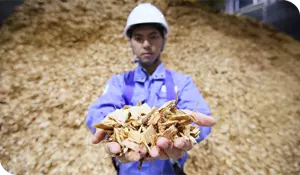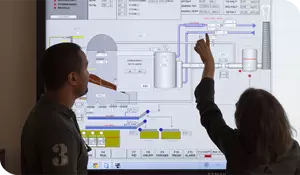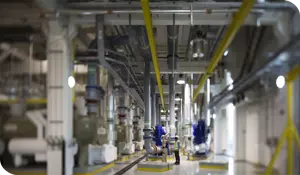As a key player in energy management, Veolia has unique expertise in energy efficiency, heating and cooling network management and renewable energy production. As a partner of cities and industry, the Group optimizes their energy purchases, ensures balance in their energy mix by including renewable energy and makes the necessary changes to improve the energy efficiency of their equipment.
DISCOVER OUR BUSINESSES
Heating and cooling networks

Hundreds of cities worldwide have entrusted the operation and maintenance of their heating and cooling networks, which provide heating, hot water, and air conditioning to public and private buildings, to Veolia.
The Group helps cities define a low-carbon energy strategy by developing an energy mix that privileges the use of renewable and alternative energy sources: geothermy, biomass, co-generation or recovery of heat generated by the incineration of household waste, wastewater plants, etc.
Hundreds of cities worldwide have entrusted the operation and maintenance of their heating and cooling networks, which provide heating, hot water, and air conditioning to public and private buildings, to Veolia.
Energy services for buildings

Veolia develops energy services to reduce the energy consumption and CO2 emissions of buildings while preserving the comfort of their occupants. Based on an energy audit, the Group develops an improvement plan including the installation of more energy-efficient equipment, tools for monitoring consumption and managing performance, as well as devices encouraging occupants to save energy.
Hubgrade is a hypervision system and a building and infrastructure energy efficiency monitoring service developed by Veolia. Designed as a truly integrated management platform, Hubgrade collects data in real time which is analyzed by the Group's experts to optimize work. This tool allows additional energy savings of up to 15 % to be made on energy efficiency in buildings compared to other energy efficiency services on the market. Veolia currently manages 9 Hubgrade centers worldwide.
Veolia develops energy services to reduce the energy consumption and CO2 emissions of buildings while preserving the comfort of their occupants.
Industrial utilities

Veolia's energy solutions meet the reliability, quality, availability and cost requirements of industrial customers for which energy is a key competitiveness issue. The Group optimizes industrial utilities, regardless of their nature (steam generation, cooling, electricity, compressed air), as well as energy use related to processes and industrial buildings. This allows Veolia to help secure supply for its customers and reduce their energy and carbon footprint.
Veolia's energy solutions meet the reliability, quality, availability and cost requirements of industrial customers for which energy is a key competitiveness issue.


